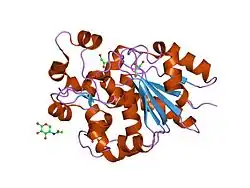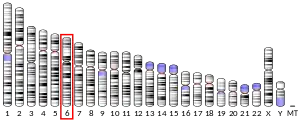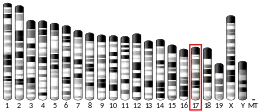PPT2
Lysosomal thioesterase PPT2 (PPT-2), also known as S-thioesterase G14, is an enzyme that in humans is encoded by the PPT2 gene.[5][6][7]
| PPT2 | |||||||||||||||||||||||||||||||||||||||||||||||||||
|---|---|---|---|---|---|---|---|---|---|---|---|---|---|---|---|---|---|---|---|---|---|---|---|---|---|---|---|---|---|---|---|---|---|---|---|---|---|---|---|---|---|---|---|---|---|---|---|---|---|---|---|
 | |||||||||||||||||||||||||||||||||||||||||||||||||||
| |||||||||||||||||||||||||||||||||||||||||||||||||||
| Identifiers | |||||||||||||||||||||||||||||||||||||||||||||||||||
| Aliases | PPT2, C6orf8, G14, PPT-2, palmitoyl-protein thioesterase 2 | ||||||||||||||||||||||||||||||||||||||||||||||||||
| External IDs | OMIM: 603298 MGI: 1860075 HomoloGene: 10448 GeneCards: PPT2 | ||||||||||||||||||||||||||||||||||||||||||||||||||
| |||||||||||||||||||||||||||||||||||||||||||||||||||
| |||||||||||||||||||||||||||||||||||||||||||||||||||
| |||||||||||||||||||||||||||||||||||||||||||||||||||
| |||||||||||||||||||||||||||||||||||||||||||||||||||
| |||||||||||||||||||||||||||||||||||||||||||||||||||
| Wikidata | |||||||||||||||||||||||||||||||||||||||||||||||||||
| |||||||||||||||||||||||||||||||||||||||||||||||||||
Function
This gene encodes a member of the palmitoyl protein thioesterase family. The encoded glycosylated lysosomal protein has palmitoyl-CoA hydrolase activity in vitro, but does not hydrolyze palmitate from cysteine residues in proteins.[5]
References
- ENSG00000231618, ENSG00000168452, ENSG00000228116, ENSG00000236649, ENSG00000206256, ENSG00000206329, ENSG00000221988 GRCh38: Ensembl release 89: ENSG00000227600, ENSG00000231618, ENSG00000168452, ENSG00000228116, ENSG00000236649, ENSG00000206256, ENSG00000206329, ENSG00000221988 - Ensembl, May 2017
- GRCm38: Ensembl release 89: ENSMUSG00000015474 - Ensembl, May 2017
- "Human PubMed Reference:". National Center for Biotechnology Information, U.S. National Library of Medicine.
- "Mouse PubMed Reference:". National Center for Biotechnology Information, U.S. National Library of Medicine.
- "Entrez Gene: palmitoyl-protein thioesterase 2".
- Soyombo AA, Hofmann SL (October 1997). "Molecular cloning and expression of palmitoyl-protein thioesterase 2 (PPT2), a homolog of lysosomal palmitoyl-protein thioesterase with a distinct substrate specificity". J. Biol. Chem. 272 (43): 27456–63. doi:10.1074/jbc.272.43.27456. PMID 9341199.
- Soyombo AA, Yi W, Hofmann SL (March 1999). "Structure of the human palmitoyl-protein thioesterase-2 gene (PPT2) in the major histocompatibility complex on chromosome 6p21.3". Genomics. 56 (2): 208–16. doi:10.1006/geno.1998.5703. PMID 10051407.
Further reading
- Gupta P, Soyombo AA, Atashband A, et al. (2001). "Disruption of PPT1 or PPT2 causes neuronal ceroid lipofuscinosis in knockout mice". Proc. Natl. Acad. Sci. U.S.A. 98 (24): 13566–71. Bibcode:2001PNAS...9813566G. doi:10.1073/pnas.251485198. PMC 61081. PMID 11717424.
- Aguado B, Campbell RD (1999). "Characterization of a human MHC class III region gene product with S-thioesterase activity". Biochem. J. 341 ( Pt 3) (Pt 3): 679–89. doi:10.1042/bj3410679. PMC 1220406. PMID 10417332.
- Simpson JC, Wellenreuther R, Poustka A, et al. (2000). "Systematic subcellular localization of novel proteins identified by large-scale cDNA sequencing". EMBO Rep. 1 (3): 287–92. doi:10.1093/embo-reports/kvd058. PMC 1083732. PMID 11256614.
- Hancock DB, Eijgelsheim M, Wilk JB, et al. (2010). "Meta-analyses of genome-wide association studies identify multiple novel loci associated with pulmonary function". Nat. Genet. 42 (1): 45–52. doi:10.1038/ng.500. PMC 2832852. PMID 20010835.
- Wiemann S, Weil B, Wellenreuther R, et al. (2001). "Toward a Catalog of Human Genes and Proteins: Sequencing and Analysis of 500 Novel Complete Protein Coding Human cDNAs". Genome Res. 11 (3): 422–35. doi:10.1101/gr.GR1547R. PMC 311072. PMID 11230166.
- Calero G, Gupta P, Nonato MC, et al. (2003). "The crystal structure of palmitoyl protein thioesterase-2 (PPT2) reveals the basis for divergent substrate specificities of the two lysosomal thioesterases, PPT1 and PPT2". J. Biol. Chem. 278 (39): 37957–64. doi:10.1074/jbc.M301225200. PMID 12855696.
- Mungall AJ, Palmer SA, Sims SK, et al. (2003). "The DNA sequence and analysis of human chromosome 6". Nature. 425 (6960): 805–11. Bibcode:2003Natur.425..805M. doi:10.1038/nature02055. PMID 14574404.
- Barcellos LF, May SL, Ramsay PP, et al. (2009). Roopenian DC (ed.). "High-Density SNP Screening of the Major Histocompatibility Complex in Systemic Lupus Erythematosus Demonstrates Strong Evidence for Independent Susceptibility Regions". PLOS Genet. 5 (10): e1000696. doi:10.1371/journal.pgen.1000696. PMC 2758598. PMID 19851445.
- McKinnon E, Morahan G, Nolan D, et al. (2009). "Association of MHC SNP genotype with susceptibility to type 1 diabetes: a modified survival approach". Diabetes Obes Metab. 11 (Suppl 1): 92–100. doi:10.1111/j.1463-1326.2008.01009.x. PMC 2755510. PMID 19143821.
- Mehrle A, Rosenfelder H, Schupp I, et al. (2006). "The LIFEdb database in 2006". Nucleic Acids Res. 34 (Database issue): D415–8. doi:10.1093/nar/gkj139. PMC 1347501. PMID 16381901.
- Gerhard DS, Wagner L, Feingold EA, et al. (2004). "The Status, Quality, and Expansion of the NIH Full-Length cDNA Project: The Mammalian Gene Collection (MGC)". Genome Res. 14 (10B): 2121–7. doi:10.1101/gr.2596504. PMC 528928. PMID 15489334.
- Xie T, Rowen L, Aguado B, et al. (2003). "Analysis of the Gene-Dense Major Histocompatibility Complex Class III Region and Its Comparison to Mouse". Genome Res. 13 (12): 2621–36. doi:10.1101/gr.1736803. PMC 403804. PMID 14656967.
- Hartley JL, Temple GF, Brasch MA (2000). "DNA Cloning Using In Vitro Site-Specific Recombination". Genome Res. 10 (11): 1788–95. doi:10.1101/gr.143000. PMC 310948. PMID 11076863.
- Clark HF, Gurney AL, Abaya E, et al. (2003). "The Secreted Protein Discovery Initiative (SPDI), a Large-Scale Effort to Identify Novel Human Secreted and Transmembrane Proteins: A Bioinformatics Assessment". Genome Res. 13 (10): 2265–70. doi:10.1101/gr.1293003. PMC 403697. PMID 12975309.
- Strausberg RL, Feingold EA, Grouse LH, et al. (2002). "Generation and initial analysis of more than 15,000 full-length human and mouse cDNA sequences". Proc. Natl. Acad. Sci. U.S.A. 99 (26): 16899–903. Bibcode:2002PNAS...9916899M. doi:10.1073/pnas.242603899. PMC 139241. PMID 12477932.
- Wiemann S, Arlt D, Huber W, et al. (2004). "From ORFeome to Biology: A Functional Genomics Pipeline". Genome Res. 14 (10B): 2136–44. doi:10.1101/gr.2576704. PMC 528930. PMID 15489336.
- Hillman RT, Green RE, Brenner SE (2004). "An unappreciated role for RNA surveillance". Genome Biol. 5 (2): R8. doi:10.1186/gb-2004-5-2-r8. PMC 395752. PMID 14759258.
This article incorporates text from the United States National Library of Medicine, which is in the public domain.
This article is issued from Wikipedia. The text is licensed under Creative Commons - Attribution - Sharealike. Additional terms may apply for the media files.



